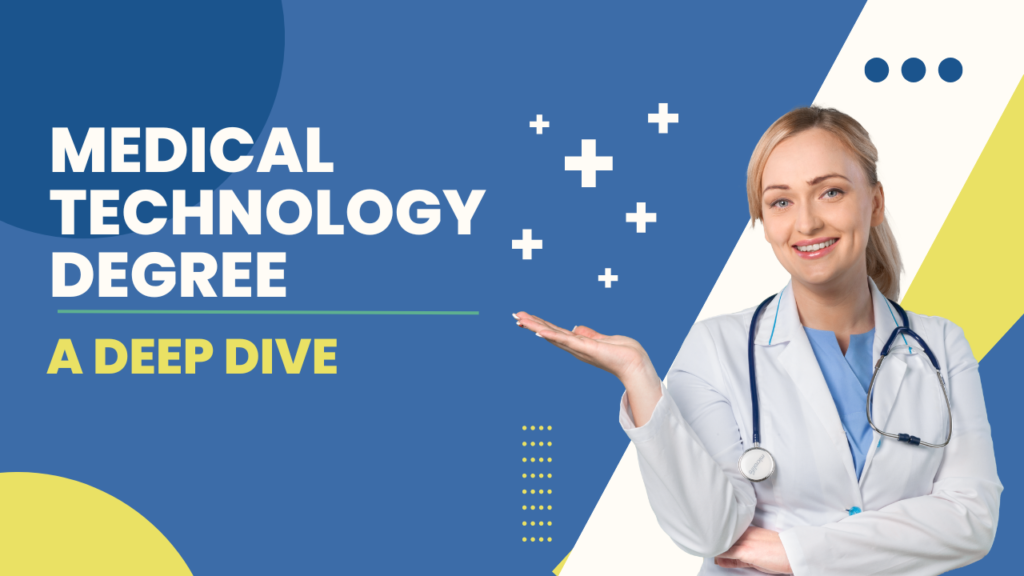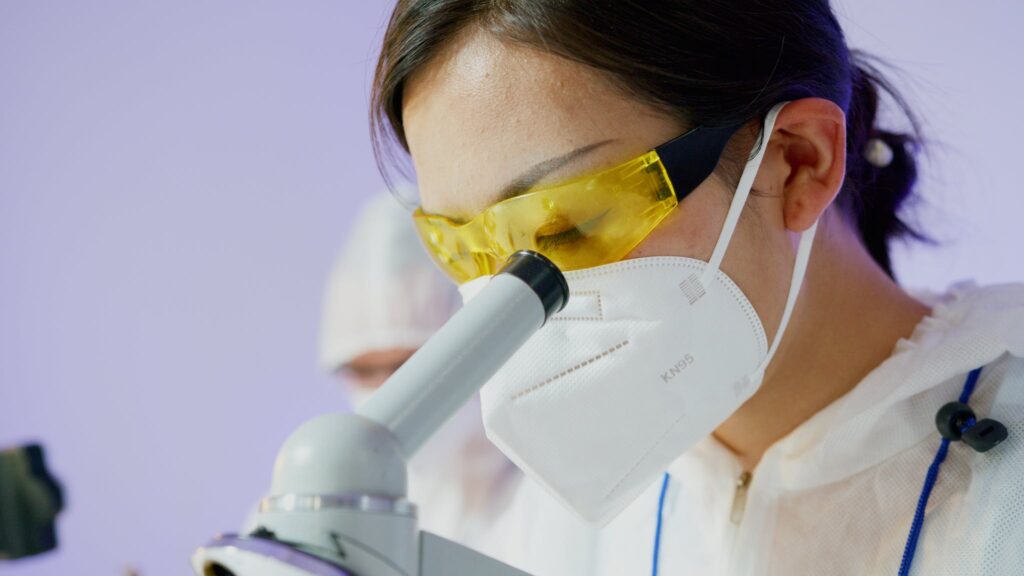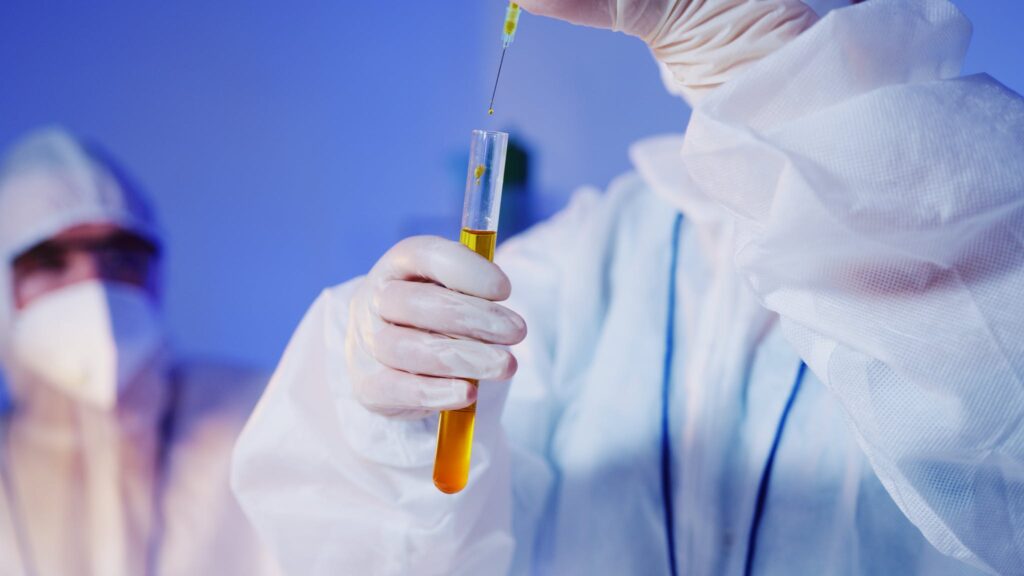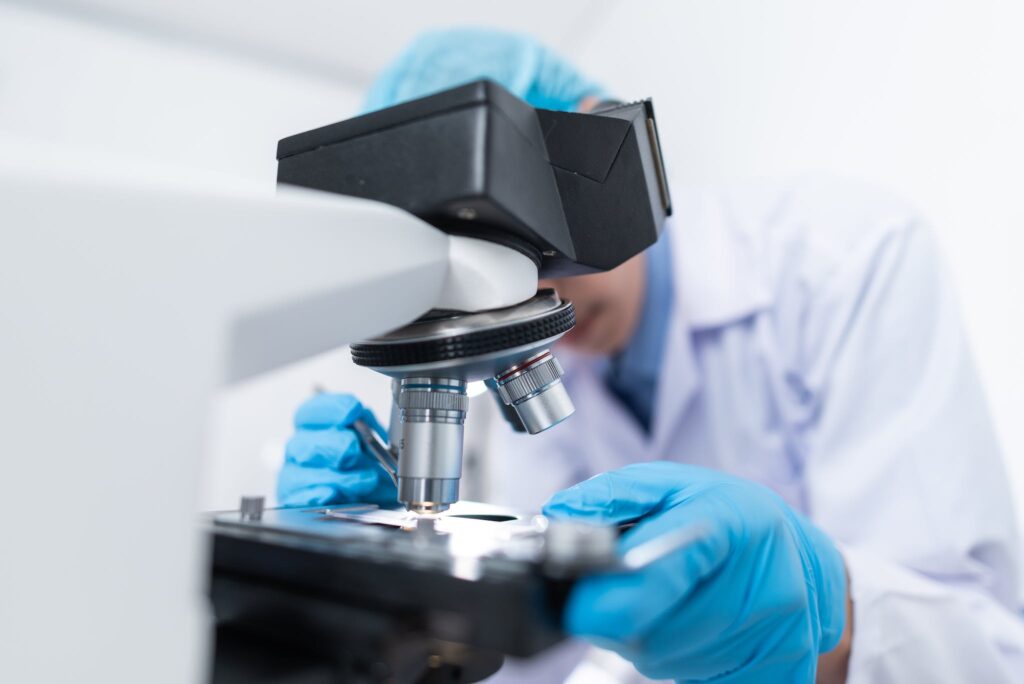Medical Technology Degree: A Deep Dive
In the dynamic intersection of healthcare and innovation, Medical Technology emerges as a pivotal field driving transformative advancements. This degree seamlessly blends medical sciences with cutting-edge technologies, fostering a realm where precision meets progress.
Continue reading on this brief exploration of the multifaceted landscape of Medical Technology, delving into the essential role it plays in revolutionizing patient care and shaping the future of healthcare.
Types of Medical Technology Degrees

Medical Technology, like most degrees, has multiple types and levels that vary significantly in both knowledge and training mechanics.. Here are the types of medical technology degrees:
Associate’s Degrees in Medical Technology: Laying the Groundwork
Imagine the world of medical technology as a sprawling landscape. An Associate’s Degree is like your passport to this realm. Over two years, you’ll dip your toes into the basics – understanding the nuts and bolts of medical sciences and getting hands-on experience with crucial tech tools. Think of it as building the foundation of a sturdy house; you’re gearing up for practical roles or paving the way for further studies.
Bachelor’s Degrees in Medical Technology: Building Expertise Brick by Brick
Now, let’s talk about the next level – a Bachelor’s Degree. This four-year journey is like constructing a skyscraper of knowledge. Here, you dive deeper into medical laboratory techniques, data analysis, and the latest technologies. It’s not just about the basics anymore; it’s about adding rooms to your intellectual house. By the end, you’re equipped for a variety of roles in the ever-evolving healthcare field.
Master’s Degrees in Medical Technology: Architecting Innovation
So, you’ve built your house, but why stop there? A Master’s Degree is your ticket to becoming an architect of medical innovation. In this advanced program, you refine your skills, explore specialized areas, and dive into research projects. Picture it as the final touch on your masterpiece. With a Master’s, you’re not just part of the future; you’re actively shaping it. This is where breakthroughs happen, and you become a trailblazer in the world of healthcare technology.
Roles and Responsibilities of Medical Technologists
In the intricate tapestry of healthcare, Medical Technologists play a pivotal role, working diligently behind the scenes to ensure the accuracy and reliability of diagnostic information. These professionals are the unsung heroes of the clinical laboratory, whose expertise spans various crucial responsibilities.
Clinical laboratory testing is at the heart of a medical technologist’s duties. This involves conducting a diverse array of diagnostic procedures to analyze specimens collected from patients. These dedicated professionals meticulously examine samples using advanced laboratory equipment, from blood and urine to tissues and other bodily fluids. This step is akin to decoding the language of the body, extracting valuable insights that guide medical decisions.
Delving deeper, Medical Technologists specialize in the analysis of body fluids, cells, and tissues. Imagine them as scientific detectives, scrutinizing microscopic elements to uncover vital information. Through techniques like microscopy and molecular testing, they identify cellular irregularities, abnormal fluid components, or tissue anomalies. This meticulous analysis serves as a diagnostic compass, guiding physicians in understanding the intricacies of a patient’s health.
The crux of a Medical Technologist’s responsibility is accurately identifying diseases and infections. By employing a range of diagnostic procedures and laboratory tests, they decipher the telltale signs of various medical conditions. Whether it’s detecting infectious agents, measuring the levels of specific substances, or identifying cellular abnormalities, these professionals act as diagnostic detectives, crucial to providing healthcare practitioners with the precise information needed for effective treatment strategies.
In essence, medical technologists are the guardians of diagnostic accuracy, working diligently to unravel the mysteries within the human body and contributing significantly to the advancement of modern medicine.

Important Skills for Medical Technologists
Medical Technologists stand at the forefront, armed with technology and a comprehensive set of skills that form the bedrock of their crucial role. Here, we unravel the key skills that transform these professionals into indispensable contributors to the precision of medical science.
A fundamental skill for any aspiring Medical Technologist is a robust understanding of biology, chemistry, and medicine. It’s akin to possessing a versatile toolbox, allowing them to comprehend the intricacies of the human body at both macro and microscopic levels. With this foundation, these experts navigate the nuances of clinical laboratory testing, interpreting results with a depth of knowledge that ensures the accuracy and reliability of diagnostic findings.
In the realm of Medical Technology, precision is paramount. Medical Technologists are meticulous architects of accuracy, paying scrupulous attention to detail in every step of their work. From sample collection to the analysis of minute cellular structures, their commitment to precision ensures that no crucial detail is overlooked. This keen attention becomes the linchpin in the diagnostic process, where even the smallest oversight can have significant implications for patient care.
The ability to think critically and analyze information is the backbone of a Medical Technologist’s skill set. Picture them as diagnostic detectives faced with a puzzle in the form of lab results. Their analytical prowess comes to the forefront as they decipher patterns, anomalies, and deviations. This skill not only aids in identifying diseases and infections accurately but also contributes to ongoing advancements in medical research and technology.
In essence, the prowess of Medical Technologists extends beyond the laboratory equipment; it resides in a dynamic fusion of knowledge, attention to detail, and critical thinking. These skills collectively empower them to navigate the complexities of healthcare diagnostics and uphold the standards of precision that are vital for patient well-being.

Medical Technology Degree Curriculum
The Medical Technology curriculum is finely tuned to cultivate a profound understanding of the intersection between medical sciences and cutting-edge technology. Let’s delve into the key components that shape the academic landscape for aspiring Medical Technologists.
The journey kicks off with a solid foundation in the sciences. Before diving into the intricacies of medical technology, students typically engage in comprehensive courses in biology, chemistry, and related disciplines. These prerequisites serve as the building blocks, equipping students with the essential knowledge needed to comprehend the complexities of the human body and the principles that underpin medical technology.
Once the groundwork is laid, students transition into the heart of the curriculum – laboratory technique courses. Here, they explore the practical aspects of medical technology, gaining hands-on experience in using advanced laboratory equipment. From mastering diagnostic procedures to honing skills in analyzing various specimens, these courses transform theoretical knowledge into practical expertise. It’s a journey of mastering the art of precision, where every technique learned is a step closer to becoming a proficient Medical Technologist.
As the curriculum progresses, students venture into clinical rotations – the bridge between classroom learning and real-world application. This phase immerses them in actual healthcare settings, where they work alongside seasoned professionals, applying their acquired skills in real-time scenarios. Clinical rotations provide a holistic view of the profession, offering invaluable insights into the challenges and rewards of being a Medical Technologist. It’s the crucible where theoretical understanding transforms into the ability to navigate the dynamic landscape of healthcare diagnostics.
In essence, the Medical Technology degree curriculum is a carefully curated roadmap, guiding students through the scientific fundamentals, hands-on laboratory techniques, and real-world applications. It’s a transformative journey that prepares future Medical Technologists to contribute meaningfully to the ever-evolving field of healthcare technology.

Certification for Medical Technologists
In the realm of Medical Technology, certification stands as the hallmark of professional expertise, signaling to employers and the healthcare community that an individual has not only completed their academic journey but has also met rigorous standards of competency. Let’s explore the significance of certification, the landscape of certification exams, and the post-nominal initials that adorn the titles of certified Medical Technologists.
Importance of Certification: Validating Proficiency and Quality Care
Certification in Medical Technology is more than a credential; it’s a badge of proficiency and commitment to quality healthcare. Employers value certified Medical Technologists for their demonstrated competence, ensuring that they possess the skills and knowledge necessary for accurate diagnostic practices. Furthermore, certification enhances the credibility of the profession, instilling confidence in patients and colleagues that the certified technologist adheres to the highest standards of performance and ethics.
Overview of Certification Exams: Rigorous Assessment of Competence
To attain certification, aspiring Medical Technologists must successfully navigate through rigorous examinations that evaluate their knowledge, skills, and ability to perform essential job tasks. These exams are meticulously designed to cover a broad spectrum of topics, ranging from laboratory techniques to the interpretation of diagnostic results. Notable certifying bodies, such as the American Society for Clinical Pathology (ASCP) and the Board of Certification (BOC), administer exams that challenge candidates to demonstrate their mastery of the field.
Post-Nominal Initials: A Symbol of Achievement
Upon successfully passing certification exams, Medical Technologists are granted the privilege of affixing post-nominal initials to their professional titles. These initials, such as MT (Medical Technologist) or MLS (Medical Laboratory Scientist), become more than mere letters; they represent a significant achievement and a commitment to maintaining the highest standards of professional practice. Beyond a symbolic addition, these post-nominals serve as a tangible testament to the technologist’s dedication to ongoing learning and excellence in the field.
In conclusion, certification for Medical Technologists is the gateway to professional recognition and a commitment to delivering exceptional healthcare. The importance of certification, the rigors of certification exams, and the subsequent post-nominal initials collectively define a certified Medical Technologist as a beacon of proficiency and dedication in the dynamic landscape of medical diagnostics.

Career Paths (and Salary Prospects) with a Medical Technology Degree
Pursuing a career path that gets unlocked upon finishing a medical technology degree is always a good move. Not only are these professions in-demand they also have immense value to society. Here are some of the most common medical technology career paths:
Clinical Laboratory Scientist:
Definition: Clinical Laboratory Scientists, also known as Medical Laboratory Scientists, conduct complex medical laboratory tests to help diagnose, treat, and prevent diseases.
Value to Society: They play a pivotal role in accurate disease detection, influencing critical medical decisions and ensuring patient care efficacy.
Training Required: A bachelor’s degree in Medical Technology or a related field, followed by certification.
Medical Imaging Technologist:
Definition: Medical Imaging Technologists operate and maintain medical imaging equipment such as X-ray, MRI, and CT scanners, producing diagnostic images.
Value to Society: They provide vital visual insights for physicians, aiding in the diagnosis and monitoring of various medical conditions.
Training Required: Typically, an associate’s or bachelor’s degree in Radiologic Technology or a related field, with licensure.
Nuclear Medicine Technologist:
Definition: Nuclear Medicine Technologists use radioactive materials to create images that help diagnose and treat diseases, particularly in the field of oncology.
Value to Society: They contribute to the detection and management of conditions like cancer, heart disease, and certain neurological disorders.
Training Required: A bachelor’s degree in Nuclear Medicine Technology and certification.
Biomedical Engineer:
Definition: Biomedical Engineers design and maintain medical equipment, develop healthcare technologies, and collaborate with healthcare professionals to enhance patient care.
Value to Society: They innovate medical technologies, improving diagnostics, treatment options, and overall healthcare efficiency.
Training Required: A bachelor’s degree in Biomedical Engineering or a related field; some roles may require a master’s or higher.
Health Informatics Specialist:
Definition: Health Informatics Specialists manage and analyze healthcare data, ensuring the efficient use of information technology in healthcare settings.
Value to Society: They optimize the use of data for informed decision-making, improving patient outcomes and streamlining healthcare processes.
Training Required: A bachelor’s degree in Health Informatics or a related field; advanced roles may require a master’s degree.
Medical and Clinical Laboratory Manager:
Definition: Laboratory Managers oversee the operations of clinical laboratories, ensuring quality control, regulatory compliance, and efficient workflow.
Value to Society: They play a crucial role in maintaining the integrity of laboratory testing, contributing to accurate diagnoses and effective patient care.
Training Required: A bachelor’s or master’s degree in Medical Technology or a related field, along with substantial laboratory experience.
Biostatistician:
Definition: Biostatisticians analyze data from medical research studies to draw meaningful conclusions and contribute to evidence-based decision-making in healthcare.
Value to Society: They enhance the reliability of medical research, supporting the development of new treatments and interventions.
Training Required: A master’s or doctoral degree in Biostatistics, Statistics, or a related field, with expertise in medical research methodologies.
Hospital or Clinical Laboratory Technologist:
Definition: Hospital or Clinical Laboratory Technologists perform a range of diagnostic tests in hospital or clinical settings, aiding in the detection and monitoring of various medical conditions.
Value to Society: They contribute directly to patient care by producing accurate and timely laboratory results, influencing clinical decisions.
Training Required: A bachelor’s degree in Medical Technology or a related field, along with certification.
Research Laboratory Technologist:
Definition: Research Laboratory Technologists work in research settings, assisting scientists and researchers in conducting experiments, analyzing data, and advancing scientific knowledge.
Value to Society: They play a crucial role in the scientific discovery process, contributing to advancements in medicine, biotechnology, and healthcare innovation.
Training Required: A bachelor’s or master’s degree in a relevant scientific field, depending on the nature and scope of the research.
Genetic Counselor:
Definition: Genetic Counselors provide guidance to individuals and families regarding genetic disorders, risk assessment, and the implications of genetic information.
Value to Society: They facilitate informed decision-making related to genetic health, supporting individuals in understanding and managing genetic risks.
Training Required: A master’s degree in Genetic Counseling or a related field, along with certification.
Job Outlook for Medical Technologists
As the healthcare landscape continues to evolve, the role of Medical Technologists stands as a linchpin in the quest for accurate diagnostics and patient care. The job outlook for this profession reflects not only its current importance but also anticipates a trajectory of sustained growth.
Projected Growth of the Field: Riding the Wave of Advancements
The demand for skilled Medical Technologists is on an upward trajectory, and the projections affirm a robust future for professionals in this field. The Bureau of Labor Statistics (BLS) and other industry reports consistently forecast a steady increase in job opportunities for Medical Technologists. This growth is attributed to various factors, including the aging population, which necessitates more diagnostic testing, and the continuous integration of advanced technologies in healthcare.
As individuals age, the need for medical interventions and diagnostic procedures rises, creating a cascade effect on the demand for skilled Medical Technologists. Additionally, advancements in medical research and technology continually introduce new diagnostic tools, further amplifying the demand for professionals who can adeptly navigate and utilize these innovations.
The demand for accurate and timely diagnostic information is not limited to any particular region; it’s a global necessity. As healthcare systems around the world strive to enhance patient outcomes and efficiency, the need for skilled Medical Technologists transcends borders. This global relevance further strengthens the job outlook for those entering or already established in the field.
In conclusion, the job outlook for Medical Technologists is marked by a promising trajectory, propelled by evolving healthcare needs, technological advancements, and a commitment to enhancing patient care. As these professionals continue to play a crucial role in the diagnostic landscape, their career prospects remain vibrant and responsive to the dynamic changes in the healthcare industry.
Applying to Medical Technology Degree Programs
Admission to Medical Technology degree programs can be competitive, as institutions seek individuals with the academic prowess, dedication, and potential to excel in the field. Crafting a standout application involves showcasing not only academic achievements but also relevant experiences, such as internships, research projects, or work in healthcare settings.
- Academic Achievement and Standardized Tests: Meeting the Mark
High academic achievement is a key component of a competitive application. Admissions committees often scrutinize undergraduate GPAs, looking for a strong performance in science and relevant coursework. Some programs may also require applicants to submit scores from standardized tests such as the GRE (Graduate Record Examination) to further assess their academic aptitude.
- Demonstrated Passion and Motivation: Personal Statements and Interviews
Beyond numbers and transcripts, applicants are encouraged to use personal statements or interviews as opportunities to convey their passion for medical technology. This is a chance to articulate why they are drawn to the field, how their experiences have shaped their aspirations, and what they hope to contribute to the profession. Demonstrating a clear understanding of the challenges and advancements in medical technology can distinguish an applicant from the competition.
- Letters of Intent: Conveying Commitment
Submitting a well-crafted letter of intent or personal statement is another crucial element of a competitive application. This letter allows applicants to articulate their commitment to the field, express why they are drawn to the specific program, and outline their career goals in medical technology.
In essence, applying to a Medical Technology degree program requires a strategic approach that goes beyond academic achievements. Crafting a competitive application involves presenting a holistic profile that showcases not only academic excellence but also a genuine passion for the field and a commitment to contributing to the advancements in healthcare technology.
Choosing the Right Medical Technology Program
Selecting the ideal Medical Technology program is a pivotal decision that shapes the foundation of a rewarding career in healthcare technology. As you embark on this journey, considerations such as the types of schools and training formats, accreditation, and financial aid availability become crucial factors in making an informed choice.
Types of Schools and Training Formats: Tailoring Education to Your Needs
Medical Technology programs are offered in various institutions, including universities, colleges, and vocational schools. Consider the atmosphere and resources each type of institution provides. Universities often offer comprehensive programs with opportunities for research, while colleges and vocational schools might emphasize practical, hands-on training. Additionally, the choice between on-campus and online formats adds another layer to the decision-making process. On-campus programs offer a traditional classroom setting, fostering in-person interactions, while online formats provide flexibility for those balancing work or other commitments.
Accredited Programs: Ensuring Quality and Recognition
One non-negotiable factor in choosing a Medical Technology program is accreditation. Accredited programs meet specific standards of quality, ensuring that the education provided aligns with industry expectations. Look for programs accredited by recognized accrediting bodies, such as the National Accrediting Agency for Clinical Laboratory Sciences (NAACLS) in the United States. Attending an accredited program not only guarantees a high-quality education but also enhances your eligibility for certifications and employment opportunities.
Financial Aid Availability: Navigating the Cost of Education
The financial aspect of pursuing a Medical Technology degree is a significant consideration. Explore the financial aid options available at different institutions, including scholarships, grants, and loans. Some schools may offer specific scholarships for students in medical technology programs, while government-funded aid programs can provide additional support. Investigate the overall cost of attendance, factoring in tuition, fees, and potential additional expenses like textbooks and laboratory materials. Understanding the financial landscape helps ensure that your educational investment aligns with your budget and future career goals.
Program Reputation and Alumni Success: A Glimpse into Future Prospects
Research the program’s reputation and track record of alumni success. Programs with a strong reputation often have well-established connections with healthcare institutions, potentially providing valuable networking opportunities and internships. Look for testimonials from alumni, explore where graduates have gone in their careers, and consider the program’s overall impact on the field. This insight provides a glimpse into the potential outcomes and opportunities awaiting you upon completion of the program.
In conclusion, choosing the right Medical Technology program involves a thoughtful evaluation of school types, accreditation, financial aid options, and the program’s overall reputation. By navigating these considerations with a focus on your educational and career goals, you can embark on a path that sets the stage for a fulfilling and impactful career in healthcare technology.

Starting a Career as a Medical Technologist
The post-graduation job hunt can be both exhilarating and challenging. While the demand for Medical Technologists is robust, competition for coveted positions is a reality. Begin by crafting a compelling resume that highlights your education, clinical experience, and any relevant internships or research projects. Apply to a diverse range of positions, considering various healthcare settings such as hospitals, clinics, and research laboratories.
Once you secure a position, the learning curve continues with on-the-job training. The transition from the controlled environment of the classroom to the dynamic reality of a healthcare setting involves adapting to specific laboratory protocols, equipment, and workflows. Embrace the guidance of seasoned colleagues, ask questions, and actively participate in hands-on experiences. On-the-job training is an invaluable phase where theoretical knowledge transforms into practical expertise.
In the dynamic field of Medical Technology, staying relevant requires a commitment to continuous learning and skill maintenance. Regularly participate in professional development opportunities, attend workshops, and stay informed about emerging technologies and advancements in the field. Additionally, maintaining certification is crucial. Certification boards often require professionals to demonstrate ongoing education and competency through continuing education credits.
As you settle into your role, consider your long-term career goals. Seek opportunities for specialization or advanced certifications that align with your interests. Many Medical Technologists explore avenues for career advancement, such as moving into supervisory or managerial roles.
Is It Worth It?
Navigating the complex intersection of medical sciences and cutting-edge technology requires dedication, resilience, and a thirst for knowledge. As graduates embark on their careers, equipped with a profound understanding of diagnostics and a toolkit of essential skills, they contribute significantly to the ever-evolving landscape of healthcare technology. The challenges faced along the way transform into stepping stones toward professional mastery, making the journey not only academically enriching but also a pathway to a fulfilling and impactful career in the vital field of Medical Technology.
Frequently Asked Questions About the Medical Technology Degree
Is a med tech a doctor?
No, a Medical Technologist (Med Tech) is not a doctor. While both play crucial roles in healthcare, a Med Tech specializes in laboratory diagnostics, conducting tests to aid in patient diagnoses. Doctors, on the other hand, are physicians with extensive medical training, responsible for clinical assessments, diagnoses, and treatment plans.
What are the related words to medical technology?
Related terms include Clinical Laboratory Science, Medical Laboratory Technology, and Biomedical Science. Additionally, terms like Med Tech, Clinical Laboratory Scientist, and Laboratory Technologist are commonly used to describe professionals in the field. Biotechnology, diagnostics, and laboratory medicine are also associated terms reflecting the broader scope of medical technology.
Is BS Medical Technology hard?
The difficulty of a Bachelor of Science (BS) in Medical Technology program varies based on individual strengths and study habits. It encompasses rigorous coursework in biology, chemistry, and laboratory techniques. Success demands dedication, critical thinking, and practical application of knowledge. While challenging, the program’s difficulty contributes to the development of comprehensive skills vital for a successful career in medical technology.
What is the historical development of Medical Technology that came in first?
Notably, the ancient Egyptians employed various medical instruments, showcasing an early form of medical technology. Over centuries, advancements evolved, leading to the sophisticated diagnostic and therapeutic tools we have today.
Which Medical Technology course is best?
The best Medical Technology course depends on individual career goals and interests. Key programs include Bachelor of Science in Medical Technology, Biomedical Science, or Clinical Laboratory Science. Accredited programs that align with professional certifications, such as those from the National Accrediting Agency for Clinical Laboratory Sciences (NAACLS), are highly regarded.
Looking for a different medical degree? Check out my video about the top 10 health majors you might be interested in:
